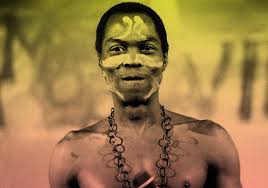by BỌ́LÁDALẸ́ TÈMÍTỌ́PẸ́ MARYAM (Amal🍒)
When Nigerians say things like ‘Nigerian music is everywhere’, ‘Entertainment has put us out globally’, with that air of self-assuredness only Nigerians can pull off, I feel like pinching them.
Wizkid, Burna, Tiwa Savage, Yemi Alade, we lay claim to these names and feel like shareholders in whatever success they might have today which frankly is why Burna’s pride would always piss you off. Are these names really ours to claim? Nigerian music is one of those few things we as Nigerians can be genuinely proud of because let’s face it, the talent pool is incredible, the sound is pure, we are the owners of Afrobeats and we would never forget that. But have you ever thought of how much of our music is also about pain and struggle?
Music is the kind of thing that once it hooks you, it might never let go, all you need is one person that keeps showing you that the pain is worth it. You just need to take a look at the lives of all the people who started from the ghetto but are now here and you’re off to the studio the next day. I know you probably don’t want to hear this but there’s only room for one Wizkid and sorry that space is filled. The struggle that artistes face just to catch that lucky break is not talked about enough but I also won’t be talking about it. I had a different kind of struggle in mind, let’s call it the lyrical struggle —the struggle that inspires the music.
Let’s talk about Afrobeats’ golden boy for a moment, Fela Anikulapo Kuti. Fela Kuti in his lifetime was responsible for pioneering and popularizing the genre both within and outside the country. Fela is best known for his fight against the then military government using his music. His lyrics were mostly a direct affront to the government and often got him in trouble which he also sang about. Fela’s music was provoking and incensing yet it was new. It was different from the sound that the people were used to. He did not have the presumed wisdom attributed to fuji and highlife, what he had was a sound that was unique and lyrics that spoke volumes in and of themselves. What he had was Afrobeats.

Fast forward to this present age, the sound has more than evolved. It has been remade and redone. It has become more upbeat than ever, more happy sounding than ever yet the core is the same. The pain is yet to fade, it has only taken on new dimensions – A slighted lover singing about the lover he lost to a richer man, a scorned artist singing about his disgrace at the club house, a woman singing about her suffering for a man that would never love her, an euphoric person singing about how they finally made it out of poverty even though they’re not really out.
When Falz’s moral instruction came out and the internet lauded it as being brave, as a renaissance of the great legend himself, I could totally relate to it. But I also think much of that was driven by the nostalgia that accompanied Moral Instruction, our music has always been about these things, about our daily struggles and pain. Yawa dey by Burna Boy, Joy by Wizkid, Anifowose by Olamide, Naira Marley’s Am I a Yahoo Boy – poverty, pain, poverty.
Music has been used to drive a lot of movements from the struggle for independence across Africa, to the struggle against military rule and its attendant oppression and now the struggle is against democracy, against ourselves and our over-extended notions of liberty, our struggles against our own humanity that drives the music of betrayals and perceived enemies who will bow when we finally arrive, that I have come to believe that Afrobeats must be struggle. Yet, I hope that one day we make music that is about nothing but unconditional happiness, music that is not about an escape from something – poverty, pain, bad governance, bad friends, heartbreak occasioned by sapa.
Music about happiness that is not in some way tied to an escape from poverty in a land where poverty is still the norm. Because some romantic part of me believes that once the music has become truly happy, when Afrobeats no longer mean struggle, then Nigerians are now in a truly happy place. Our music mirrors our society, I cannot wait for the day when we sing about happiness just because.